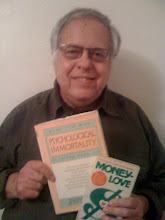One big change I have noticed is that a lot of traditional mainstays of life in America have disappeared. Some of this is due to innovation and progress, but some of it is created by something less positive. Greed and the encroachment on our habitats by ever-expanding major chains have put many neighborhood family-owned businesses on the trash heap. Just as encroachment by humans on animal habitats have threatened many species with extinction.
In my neighborhood of residential row houses in South Philadelphia, there was usually some kind of store on every corner--hardly ever one in the middle of the block. A drugstore on one corner, an Italian bakery on another, a dentist's office on one, and Big John's candy store as the busiest small business of all. Big John himself was not usually around, having more important things to do. He was, as they say now, "connected." It wasn't called the Mafia or Cosa Nostra in those days, but rather The Black Hand. Businesses under their protection had a painted image of a black hand on their front entrance, and sometimes also stenciled on the cement sidewalk.
All the neighborhood kids, including myself though I was one of the few non-Italian Americans, ran numbers slips for Big John. We got a quarter for each bag we delivered to a nondescript row home three blocks away. They were small bags, probably with 25 to 50 small slips in each one. On a normal day after school, I would deliver two bags and collect fifty cents for my efforts. I often took it out in trade--a comic book, one of my favorite chocolate covered frozen bananas, or a cup of Italian water ice, a Philadelphia specialty I've never found successfully duplicated anywhere in the world. Big John had two large upright barrel devices in his doorway, each with a large crank on the side. He added the fresh cherries and lemons, the only two flavors available, and would grind them in with the big blocks of ice.
There was also a large candy rack by the cash register, and a six seat soda fountain. As I approached puberty, the main attraction was John's four daughters, ranging in age from 12 to 22, all dark-haired beauties. They took turns running the store, except for Mary, who was the prize student in the family, quiet, shy, and the prettiest daughter of all. She was actually the valedictorian at my Junior High School class graduation, and went on to Southern High with the expectation she would win many honors.
I was living in Northeast Philadelphia by the time Mary made the newspapers--Philadelphia had three of them then, but her photo was only in the tabloid Daily News. She was one of the teenage girls involved in what were described as wild orgies held by a group of local disc jockeys in a Main Line mansion. It was the first time I heard of the sex practice known as "Golden Showers," though I'm not sure I knew exactly what it meant at the time. Dick Clark, the iconic star of American Bandstand, got his big break as a result of those orgies, while it was rumored that Mary ended up being sent to a convent by her father.
One of the disc jockeys was a man named Bob Horn, who had a local TV show called Bandstand. After the scandal, they were desperate to find a replacement, so they recruited a baby-faced young announcer who had been doing commercials for a local jewelry store on the late night movie. Clark owed his multi-million dollar TV career to a series of orgies involving teenage girls and older male disc jockeys. I hadn't graduated high school yet, so had not started my own broadcasting career. This was a shame as there were many openings and opportunities at Philadelphia radio stations in the aftermath.
A number of years later, I was on a book tour and a talk show host in Washington, D.C. was interviewing me. It was Steve Allison, another one of the radio stars caught up in that orgy scandal years earlier. I presume no one in Washington had a clue about his past, and I didn't feel it was appropriate to bring it up.
Jerry
Check out my other blog on prosperity consciousness: http://MoneyloveBlog.com

No comments:
Post a Comment